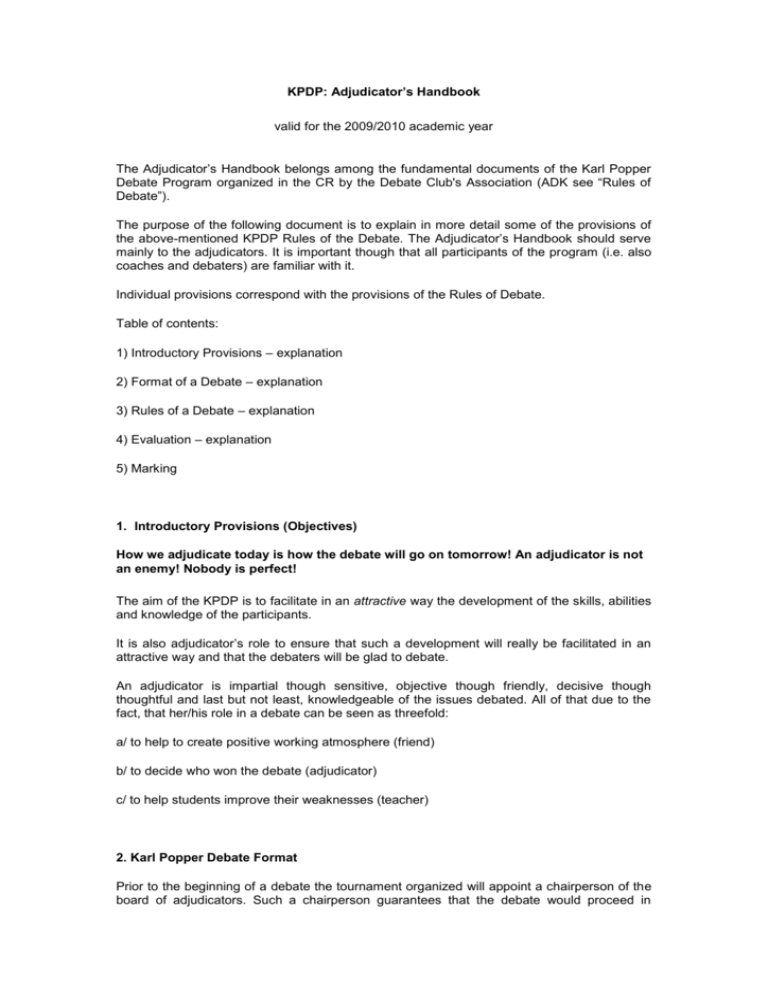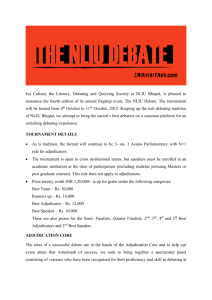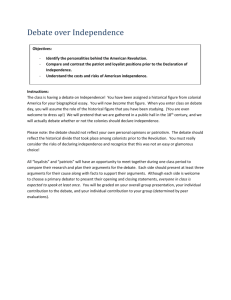KPDP: Adjudicator`s Handbook
advertisement

KPDP: Adjudicator’s Handbook valid for the 2009/2010 academic year The Adjudicator’s Handbook belongs among the fundamental documents of the Karl Popper Debate Program organized in the CR by the Debate Club's Association (ADK see “Rules of Debate”). The purpose of the following document is to explain in more detail some of the provisions of the above-mentioned KPDP Rules of the Debate. The Adjudicator’s Handbook should serve mainly to the adjudicators. It is important though that all participants of the program (i.e. also coaches and debaters) are familiar with it. Individual provisions correspond with the provisions of the Rules of Debate. Table of contents: 1) Introductory Provisions – explanation 2) Format of a Debate – explanation 3) Rules of a Debate – explanation 4) Evaluation – explanation 5) Marking 1. Introductory Provisions (Objectives) How we adjudicate today is how the debate will go on tomorrow! An adjudicator is not an enemy! Nobody is perfect! The aim of the KPDP is to facilitate in an attractive way the development of the skills, abilities and knowledge of the participants. It is also adjudicator’s role to ensure that such a development will really be facilitated in an attractive way and that the debaters will be glad to debate. An adjudicator is impartial though sensitive, objective though friendly, decisive though thoughtful and last but not least, knowledgeable of the issues debated. All of that due to the fact, that her/his role in a debate can be seen as threefold: a/ to help to create positive working atmosphere (friend) b/ to decide who won the debate (adjudicator) c/ to help students improve their weaknesses (teacher) 2. Karl Popper Debate Format Prior to the beginning of a debate the tournament organized will appoint a chairperson of the board of adjudicators. Such a chairperson guarantees that the debate would proceed in accordance with the Code of Ethics and Rules of the Debate. After the debate s/he is to fill in the “Debate Result” form and hands it in into a tabulation room. (see Rules 1.2.) The tournament organizes would then make sure based on filled in Debate Results that debaters did not break any rules about participation in more teams during a tournament and s/he keeps track of team results within the tournament. 2.1. Roles of Individual Speakers If a resolution is expressed as policy one, then adjudicator would regard not introducing a criterion by A1, or eventually by N1 as a wrong strategy. Also introducing criterion later in the debate (in A2 speech or of any other subsequent speakers) would be required as a wrong strategy and the adjudicator will not take the late introduced criterion into consideration when making his/her decision, unless both parties accept this late brought criterion in the debate and make it a part of the debate. If N2 or third speakers introduce new arguments, adjudicators would not only take such an argument into consideration, but at the same time would penalize the speaker for wrong strategy. 2.3 Preparation Time, Communication During a Debate Breaking the rule of communication coach-team being not allowed during the course of a debate or debaters talking outside the preparation time will result in lower mark in a strategy category. In case of major problems in this field the chairperson of the board of adjudicators is exceptionally allowed to interrupt the debate and ask debaters/coaches to immediate order. It is also not allowed to communicate with a speaker at the moment of his/her holding the floor - poor strategy - the one that communicates does not listen. 3. Rules of a Debate 3.1 Criterion (see also 2.1.) Well-set criterion improves the structure of a debate in an important way as it gives the debate order and sense. In case of a policy resolution a good strategy is impossible to think of without a criterion (see also Strategy). If debater by his/her argumentation or of any individual arguments does not lead to fulfilling stated criterion, they commit not only strategic but mainly a severe content mistake. The adjudicator can state that the presented case was not proved, based on the seriousness of such mistake and assuming that the opponent identifies and informs about such a mistake. 3.2 Definition If the definition which conforms to the rules of the debate is challenged the adjudicator will consider it to be poor strategy and will correspondingly lower the strategy points. In case of challenging the definition the adjudicators will expect: a) exact explanation in which point and why the definition does not conform to the rules b) an offer of a revised definition, c) explanation of the impact of the given change on the debate. (this is only recommended as a suitable strategy, it is not a violation of the Rules of the Debate if the debater does not do so). Affirmative definition may be challenged only by the N1 speaker, negative party definition only by the A2 speaker. All other disputes over the definition are to be considered poor strategy and shall be penalized. The third speakers can in their summaries touch the point. 3.3 The Burden of Proof The line between factual and value resolution may seem a bit narrow by some resolutions. For example in the resolution: “Money bring happiness”, we can understand its formulation as a claim about a situation, which is or is not, i.e. as a factual resolution, but on the other hand the use of very subjective word “happiness” evokes value resolution. In such case, it is not important for determining resolution type, whether it includes subjective word, but rather if the resolution itself contains some sort of judgment, or if it executes some sort of evaluation of reality, situation, matters…In our example money as such do not anyhow evaluate the situation, but rather state that they lead to something, they contribute. Therefore it is a factual resolution. But if the resolution would be “Money is wrong”, it would express value judgment about money and it would be a value resolution. Value judgments are most commonly used in value resolutions in form of “right”, “wrong”, “justifiable”, “moral”, “unethical”, etc. If there would be any doubts about a type of a given resolution, we assume that the resolution is factual and the adjudicator should approach it this way. 3.4 Who Wins the Debate Is clearly explained by the Rules. An adjudicator decides upon the victor on the grounds of arguments presented. Content has priority. It is possible that in supplementary marking (auxiliary marks for content, style and strategy) the winning team has less marks than the losing team. This can happen - "low point win". A debate is won by a team that on the grounds of arguments presented proved validity/invalidity of the case. Victor of a debate is not to be decided upon by arithmetic adding of upheld/refuted arguments. If the affirmative case is not refuted as a whole and still some arguments were refuted than it is an adjudicator’s duty to weight the “strength” (see Rules 4.1.) of the arguments presented. The debate is won by that team that upheld/refuted arguments most significant taking their “strength” into consideration. 3.5 Negative Constructive Case It is a general practice that the negative party introduces their own negative constructive case. Although they do not have to. 3.6 Argument supporting Evidence With all evidence used the debaters should automatically state basic bibliographical note. If they do not do so, their content evaluation should be lowered. To ask to prove reliability of a source of a generally known fact is to be considered poor strategy. If data gathered through the Internet and other public computer networks are without further verification, then they are not considered reliable. Adjudicators are to discourage in their feedback usage of tabloid papers as a source of evidence. Adjudicators are also to discourage bringing in and displaying physically of pieces of evidence during a debate. 3.9 Impromptu Debate The chairperson of the board of adjudicators is to assure that both teams have similar preparatory conditions and that no other person except the debater are allowed in the prep room. 4. Evaluation 4.1 Content If an argument is plainly weak, the adjudicator will evaluate it as such. Such an argument will not do much good to the team who presented it. On the other hand opposing team, which does not point out plainly week argument and will not explain why it is considered to be a poor argument is committing a greater sin. Irrelevant statement: a/ says nothing - has no statement value b/ does not support the validity of the line/resolution c/ is not a tool of refutation. Such a statement is simply irrelevant to the debate. The adjudicators must not be influenced by their own beliefs and prejudices, nor by their own specialized knowledge. The adjudicators must be independent while evaluating the debate. The adjudicator shall, according to his own conscience, acquaint her/himself with the issues related to the resolution in the best possible way. 4.2 Style Adjudicators are to be lenient towards students debating in their second language. Yet, they should whenever possible help students to further improve their English. Adjudicators should heavily punish rude expressions. The provision of formal dress for debaters holds for adjudicators as well. 4.3 Strategy 4.3.1 Structure and Timing Adjudicators are to pay special attention whether speakers make use of information gathered during cross-questioning. 4.3.1.a Keep in mind that timing is only one element of strategy. A speaker whose only sin is to go overtime might still get a reasonable strategy mark if every other aspect of strategy was quite outstanding. It would not be a brilliant mark - there would still be a penalty - but it would not automatically be a very low mark either. It all depends on how good all the other aspects of strategy were. Lately there were a lot of speeches going significantly over time. Adjudicators are to discourage such manners through lowering their strategy marks. 4.3.2 Stating priorities It is recommended to also note down order in which speakers react to presented arguments (whether they are able to find out the crucial ones) and if possible roughly time devoted to individual arguments. It is very important that the adjudicators understand the difference between strategy and content. Imagine a debate in which a speaker answers the critical issues with some weak rebuttal. This speaker should get poor marks for content, because the rebuttal was weak. But the speaker should get reasonable marks for strategy for focusing on the right arguments. 4.4. Cross-questioning The adjudicator is not to interrupt the debate but to prevent physical violence. 5. Marking The purpose of marking supplementary is apart of a feedback tool to serve as an additional supplementary criterion of the evaluation of the debate. Points are not a factor in deciding who won the debate though. In case of two or more teams having same results in a tournament, it will nevertheless be taken into account as one of criteria which team did better. But the most important function of the marking is feedback to individuals. Points are subjective and they differ from each individual adjudicator, whom it is recommended to use the Co-Ma table when assigning individual points. In each category it is possible to receive the following points: a) content 40 - 20 b) strategy 30 - 15 c) style 30 - 15 d) cross questions and answers 10 - 1 5.1 Consultation among Adjudicators In the DL competition consultation among adjudicators is not permitted before the adjudicators’ ballots are filled in. In the Cup competitions adjudicators are encouraged to consult their decision prior to filling in the ballot. They do not have to necessarily come to an agreement, but they would try to achieve it. 5.2 Oral feedback Each adjudicator must be ready at the end of the debate to explain, based on his/her own notes, who s/he thinks won the debate and why. Adjudicators must flow the debate.






